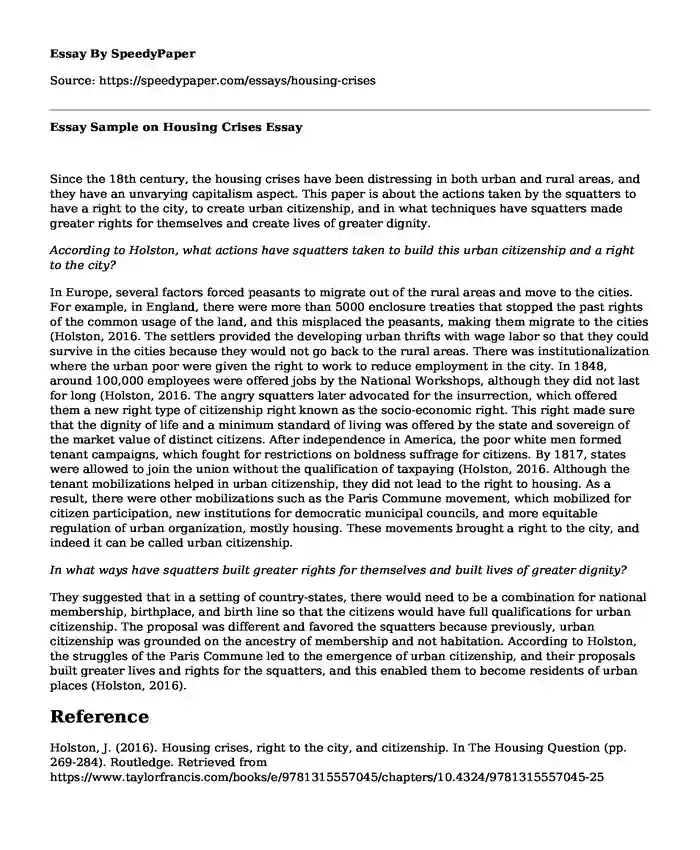Since the 18th century, the housing crises have been distressing in both urban and rural areas, and they have an unvarying capitalism aspect. This paper is about the actions taken by the squatters to have a right to the city, to create urban citizenship, and in what techniques have squatters made greater rights for themselves and create lives of greater dignity.
According to Holston, what actions have squatters taken to build this urban citizenship and a right to the city?
In Europe, several factors forced peasants to migrate out of the rural areas and move to the cities. For example, in England, there were more than 5000 enclosure treaties that stopped the past rights of the common usage of the land, and this misplaced the peasants, making them migrate to the cities (Holston, 2016. The settlers provided the developing urban thrifts with wage labor so that they could survive in the cities because they would not go back to the rural areas. There was institutionalization where the urban poor were given the right to work to reduce employment in the city. In 1848, around 100,000 employees were offered jobs by the National Workshops, although they did not last for long (Holston, 2016. The angry squatters later advocated for the insurrection, which offered them a new right type of citizenship right known as the socio-economic right. This right made sure that the dignity of life and a minimum standard of living was offered by the state and sovereign of the market value of distinct citizens. After independence in America, the poor white men formed tenant campaigns, which fought for restrictions on boldness suffrage for citizens. By 1817, states were allowed to join the union without the qualification of taxpaying (Holston, 2016. Although the tenant mobilizations helped in urban citizenship, they did not lead to the right to housing. As a result, there were other mobilizations such as the Paris Commune movement, which mobilized for citizen participation, new institutions for democratic municipal councils, and more equitable regulation of urban organization, mostly housing. These movements brought a right to the city, and indeed it can be called urban citizenship.
In what ways have squatters built greater rights for themselves and built lives of greater dignity?
They suggested that in a setting of country-states, there would need to be a combination for national membership, birthplace, and birth line so that the citizens would have full qualifications for urban citizenship. The proposal was different and favored the squatters because previously, urban citizenship was grounded on the ancestry of membership and not habitation. According to Holston, the struggles of the Paris Commune led to the emergence of urban citizenship, and their proposals built greater lives and rights for the squatters, and this enabled them to become residents of urban places (Holston, 2016).
Reference
Holston, J. (2016). Housing crises, right to the city, and citizenship. In The Housing Question (pp. 269-284). Routledge. Retrieved from https://www.taylorfrancis.com/books/e/9781315557045/chapters/10.4324/9781315557045-25
Cite this page
Essay Sample on Housing Crises. (2023, May 03). Retrieved from https://speedypaper.com/essays/housing-crises
Request Removal
If you are the original author of this essay and no longer wish to have it published on the SpeedyPaper website, please click below to request its removal:
- Reasons to Support Homeland Security Operations
- Free Essay with Questions on Piaget's Theory of Cognitive Development
- Literary Essay Sample on the Novel Good Kings Bad Kings
- Free Essay Explaining the Difference between Social Work Leadership and Management
- Analysis Essay Example on Consumer Health Information Website
- Essay Sample on Culture and Plastic Surgery
- The Warren Case Study
Popular categories





